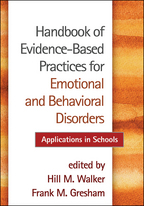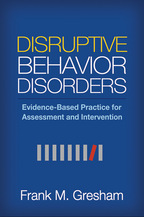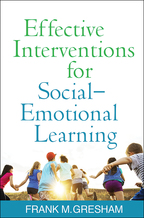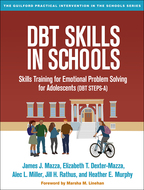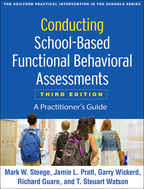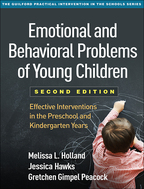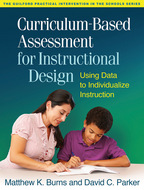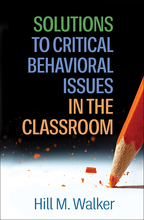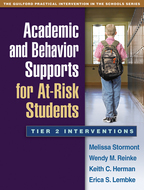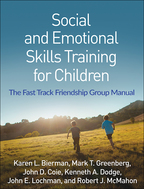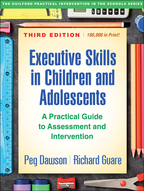Handbook of Evidence-Based Practices for Emotional and Behavioral Disorders
Applications in Schools
Edited by Hill M. Walker and Frank M. Gresham
Prologue by James M. Kauffman
HardcoverPaperbacke-bookprint + e-book
Hardcover
orderSeptember 13, 2013
ISBN 9781462512164
Price: $108.00 622 Pages
Size: 7" x 10"
Paperback
orderDecember 15, 2015
ISBN 9781462526161
Price: $72.00622 Pages
Size: 7" x 10"
“A comprehensive and extremely helpful tool for school social workers. It provides proven strategies to assist with students. This book is a one-stop shop when you need some ideas for helping students or you would like to enhance your practice….I learned many things that I didn’t know, even after practicing for ten years.”

—School Social Work Journal
“Edited by two giants in the field, this handbook is logically organized into relevant sections, with thorough coverage ranging from educational interventions to genetic factors. Critical strengths include a focus on research foundations and evidence-based practices and a clear discussion of what is and is not known about this population. Chapter authors are outstanding scholars in their specialties. Far superior to other edited volumes in this area in terms of organization, coverage, and author quality, the Handbook is a 'must buy' for specialists in behavior disorders and challenges.”

—Dan Reschly, PhD, Department of Special Education, Peabody College of Vanderbilt University
“Walker and Gresham have provided a major gift to the field. Leading experts on EBD present the foundations and specific intervention guidance needed by teachers, school psychologists, administrators, and researchers. The field of special education is changing—multi-tiered systems of support and integrated approaches to linking mental health, academic instruction, and behavioral intervention are now expected. This handbook defines the best science for assisting children with EBD and their families, while also addressing the organizational variables and data systems necessary to deliver this science. An impressive accomplishment.”

—Robert H. Horner, PhD, Alumni–Knight Endowed Professor of Special Education, University of Oregon
“I have adopted the Handbook of Evidence-Based Practices for Emotional and Behavioral Disorders as the central text for my Psychotherapeutic Interventions course. In my experience, the term 'best practice' is often thrown about without an adequate understanding of what it means. This volume provides a comprehensive look at the evidence base for a variety of assessment practices, interventions, and service delivery models used for children and adolescents with EBD, and helps students and practitioners examine current practices in light of research.”

—Adam D. Weaver, PhD, Department of Psychology, University of Nebraska at Omaha
“While every educator now recognizes the importance of evidence-based practices with all students, busy K-12 practitioners do not have the time to read all the literature, separate research from opinion, and further separate quality research from the rest. That distillation process has been done for us by Walker and Gresham in this invaluable handbook. The volume provides an indispensable roadmap and travel guide to the implementation of best practices. When implemented well, these practices can transform the trajectories of our most challenging-to-teach students.”

—Randy Sprick, PhD, Director, Safe and Civil Schools
—School Social Work Journal
“Edited by two giants in the field, this handbook is logically organized into relevant sections, with thorough coverage ranging from educational interventions to genetic factors. Critical strengths include a focus on research foundations and evidence-based practices and a clear discussion of what is and is not known about this population. Chapter authors are outstanding scholars in their specialties. Far superior to other edited volumes in this area in terms of organization, coverage, and author quality, the Handbook is a 'must buy' for specialists in behavior disorders and challenges.”
—Dan Reschly, PhD, Department of Special Education, Peabody College of Vanderbilt University
“Walker and Gresham have provided a major gift to the field. Leading experts on EBD present the foundations and specific intervention guidance needed by teachers, school psychologists, administrators, and researchers. The field of special education is changing—multi-tiered systems of support and integrated approaches to linking mental health, academic instruction, and behavioral intervention are now expected. This handbook defines the best science for assisting children with EBD and their families, while also addressing the organizational variables and data systems necessary to deliver this science. An impressive accomplishment.”
—Robert H. Horner, PhD, Alumni–Knight Endowed Professor of Special Education, University of Oregon
“I have adopted the Handbook of Evidence-Based Practices for Emotional and Behavioral Disorders as the central text for my Psychotherapeutic Interventions course. In my experience, the term 'best practice' is often thrown about without an adequate understanding of what it means. This volume provides a comprehensive look at the evidence base for a variety of assessment practices, interventions, and service delivery models used for children and adolescents with EBD, and helps students and practitioners examine current practices in light of research.”
—Adam D. Weaver, PhD, Department of Psychology, University of Nebraska at Omaha
“While every educator now recognizes the importance of evidence-based practices with all students, busy K-12 practitioners do not have the time to read all the literature, separate research from opinion, and further separate quality research from the rest. That distillation process has been done for us by Walker and Gresham in this invaluable handbook. The volume provides an indispensable roadmap and travel guide to the implementation of best practices. When implemented well, these practices can transform the trajectories of our most challenging-to-teach students.”
—Randy Sprick, PhD, Director, Safe and Civil Schools

